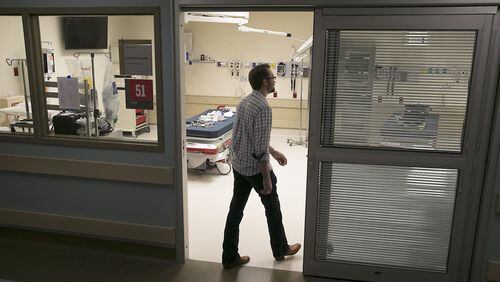The state Department of Insurance said it will closely monitor Blue Cross Blue Shield of Georgia’s new pullback on paying for patient visits to the emergency room to make sure it doesn’t abuse the policyholders.
Last month The Atlanta Journal-Constitution revealed that Blue Cross had sent a letter to patients on individual policies curtailing coverage of ER visits, starting July 1. It said if patients go to the ER without a legitimate reason, the insurer won't pay and the entire bill will go to the patient.
“You buy health insurance to make sure you are protected when something bad happens,” Jay Florence, deputy commissioner of insurance of the state Department of Insurance, said in a statement. “While we support efforts to reduce unnecessarily high premiums, we will closely monitor this new policy to make sure that it is not abused to the disadvantage of Georgia policyholders.”
Florence said the department has created a specific code for complaints related to the new Blue Cross policy and will track any that come in. The policy doesn’t go into effect for two more weeks, and no complaint calls have yet been coded for the Blue Cross ER issue, a department spokesman said.
It’s unclear how effective the complaint line will be, though. The letter Blue Cross sent to policyholders announcing the policy does not include the department’s contact information. It includes its own company complaint lines as well as federal contact information.
Earl Rogers, the president of the Georgia Hospital Association, said in a statement that the association supported the state’s vigilance. “No one who believes that they have a real health emergency should ever be discouraged from seeking care in the ER,” Rogers said.
ER doctors are raising a much bigger issue than who pays: They say the new policy could be deadly.
“You’re asking patients to determine whether they have an emergency or not,” said Dr. Matthew Keadey, the medical director of Emory University Hospital’s emergency department. “This is a big problem for patients in the state.”
Blue Cross says patients who have real reason to fear an emergency will still be covered, even if it turns out to be something else. For example, if a patient has chest pains and goes to the ER fearing a heart attack, he or she will still be covered if it turns out to be indigestion, Blue Cross spokeswoman Debbie Diamond said.
But Keadey predicts Blue Cross’ announcement will harm some patients who should go to the ER but think twice and don’t because they’re not sure.
“What’s driving this is the almighty dollar for the insurance providers,” Keadey said.
Money is driving the decision, but Blue Cross says it’s about stopping waste. There is no dispute that some patients abuse the ER for simple problems they should take to their own doctor or a clinic. The question is how best to address that.
The American College of Emergency Physicians says the way that that Blue Cross and its parent company, Anthem, is implementing the rule is illegal. The organization has more than one reason for concern. If patients continue to come to the ER and Blue Cross doesn’t pay, the doctors and hospitals will likely be left with unpaid debt.
Blue Cross is defining a legitimate emergency concern as what a “prudent layperson” would think could cause a serious danger. The company will make the call on whether the ER visit was legitimate.
In the letter Blue Cross sent to patients announcing the new rule, the company suggested using LiveHealth Online, its 24-hour online medical service, for patients who have 24-hour internet and can download an app. It also suggested urgent care clinics.
Blue Cross is now the only remaining insurer on the Obamacare health insurance exchange market in many rural areas of Georgia. In 96 of Georgia's 159 counties, the exchange offers only Blue Cross policies. So, knowing that many of its policyholders will live in out-of-the-way areas, Blue Cross says patients who live more than 15 miles from a clinic will be exempt from the rule.
The insurer, however, didn’t include that information in the letter to those policyholders. Blue Cross also told the AJC about two other exemptions that it did not include in its letter: Policyholders’ children ages 14 and under will still be covered at the ER, and any visits on a Sunday or major holiday will still be covered.
The company earlier said children under age 14 were exempted, but it corrected that later to 14 and under.
Alerting the state
The Georgia Department of Insurance says it will specifically track complaints related to Blue Cross Blue Shield’s new policy on reimbursement of emergency room visits.
The department has an online complaint portal for those with internet access, its preferred route for complaints:
The main number for the department’s consumer division is 800-656-2298 from 8 a.m. to 6 p.m. Monday through Friday.
GOVERNMENT AND POLITICAL NEWS
If it happens in Washington or under the Gold Dome, The Atlanta Journal-Constitution has somebody there to tell you what it means for all Georgians. Follow our coverage at http://www.myAJC.com/politics.
You can also join the conversation on Twitter at http://Twitter.com/GAPoliticsNews or Facebook at http://facebook.com/gapoliticsnewsnow/.
About the Author








